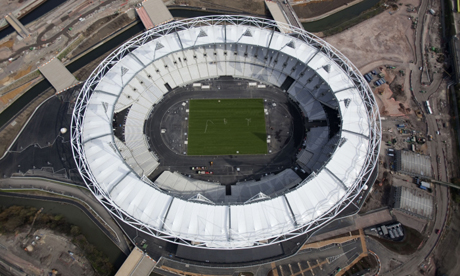Government to defend its 9,000 Olympic tickets

An aerial view of the Olympic Stadium. The government is expected to defend its allocation of tickets, arguing it is boosting UK business and giving a proportion away to children. Photograph: ODA
The government is expected to counter criticism of the 9,000 tickets it has been allocated for the 2012 Olympics by arguing it is boosting UK business and giving a proportion away to children competing in its new school games competition.
According to a breakdown obtained by the Guardian, 450 tickets will be reserved as prizes for the School Games, the government’s attempt to establish a nationwide competition that can be held up as an Olympic legacy.
A further 1,500 will be reserved for international business guests on the rationale that the success in delivering the venues on time and on budget will showcase UK plc and its construction, planning, logistics and operations capabilities, and ultimately attract investment from them.
Dennis Hone, chief executive of the Olympic Delivery Authority, said last week the £8.1bn of public money used to build the venues would have a positive effect on British industry’s image abroad.
“We have had the best of British construction. It has been a showcase for what the best of British construction can do,” he said.
A further 1,600 tickets will be distributed to international and domestic guests, including overseas dignitaries, with an emphasis on international relations. And 2,400 tickets for events outside London, such as the football tournament taking place in stadiums around the country, will be purchased by the local authorities.
The remaining 3,000 will be made available to staff who have worked on helping to deliver the Games, although they will have to pay for those tickets themselves.
The London 2012 Organising Committee (Locog), chaired by Lord Coe, has been keen to stress that all tickets for the Olympics – including those allocated to government and to sponsors– must be paid for.
But given the level of criticism of the ticketing process from some consumer groups, there has been concern about the extent to which tickets reserved for sale to public bodies and allocated to sponsors are for blue riband events and so reduce the percentage available to the public.
The government has said only that the 6,000 it will be buying with public funds are for events across the full spectrum.
Lady Dee Doocey, who chairs the sports committee at the London assembly, has criticised the number of tickets reserved for politicians, including officials from local councils in the capital.
“Every seat taken up by a government official or politician is one less seat for the public so it’s vital that government bodies are completely open and transparent about who gets them, why and who ultimately foots the bill,” she said.
Locog has promised to outline in full its plans for the second phase of ticket sales this week, inviting the estimated 1 million applicants who received no tickets at all in the first round to have first refusal on the “hundreds of thousands” that remain.
Organisers have also promised to issue a breakdown of exactly how many tickets are left, and in which sessions, in an attempt to assuage criticism that the process has not been fully transparent.
The official Olympic ticket-selling agent in France, Eventeam2012, was due to start selling their allocation to pre-registered applicants at 8am BST on Monday, but the sale was delayed “for technical reasons”.
More than 4,000 British fans are understood to have pre-registered for 48-hours of private sales before the site is open to the general public.
guardian.co.uk © Guardian News & Media Limited 2010
Published via the Guardian News Feed plugin for WordPress.
